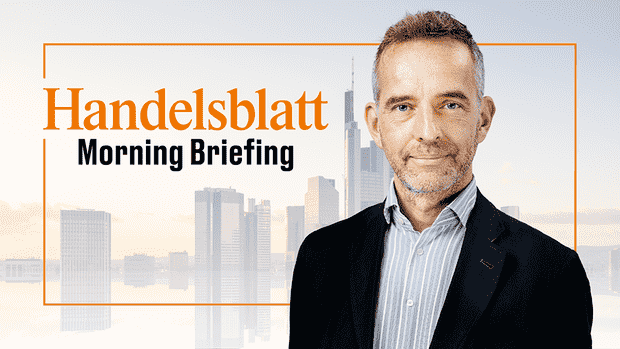Good morning dear readers,
Yesterday the Handelsblatt, together with other European media partners, revealed how dirty the shares in supposedly sustainable investment funds are sometimes. My personal aha moment: The Principal Global Sustainable Listed Infrastructure Fund and the Macquarie Sustainable Global Listed Infrastructure Fund. Although they both have the beautiful word “sustainable” in their names, they have each invested more than 40 percent of their capital in companies in the oil, coal and aviation industries. That’s like the Guttempler order investing two-fifths of its pension fund in breweries and distilleries.
It can also be better: Among the 800 funds examined, there are definitely some that actually live up to their green claim. You can find the large overview here.
All the same, the critical debate over the past few months about only supposedly sustainable investment products is beginning to have an effect. Both the market leader Blackrock and numerous other financial service providers are currently rearranging funds that were previously characterized by a particularly high level of sustainability into the standard area.
Top jobs of the day
Find the best jobs now and
be notified by email.
Background: The classification of the funds is regulated by an EU regulation. Accordingly, suppliers must categorize their products themselves. Those with a particular sustainability impact fall under Article Nine of the Regulation, the less ambitious under Chapter Eight.
The large French house Amundi is withdrawing from around 100 nine ratings, affecting around 45 billion euros in index products and actively managed funds. If there are fewer than ten products, the original classification is retained. At Blackrock, the world’s largest asset manager, 17 index funds with a capital of around 26 billion euros are affected, according to a Handelsblatt query.
Conclusion: Blackrock, Amundi and Co. are also reacting to tightened burdens of proof and new EU liability rules that will apply from 2023. We will not get a greener economy as a result. But at least a less green-washed one.
The EU’s hope for a quick solution to the subsidy dispute with the USA is dwindling. Commission Vice-President Valdis Dombrovskis, responsible for trade policy, said last week that at best a gesture by the Americans could be expected, but “nothing that would solve the problem”. The Handelsblatt learned this from EU circles.
The Americans want to pay billions in subsidies for e-cars – but only if they were assembled in the USA. Similar rules should apply to green infrastructure. Europeans feel discriminated against. Their goal: climate-friendly products from the EU should be given equal treatment with those from Canada and Mexico that benefit from US subsidies.
There is a lot at stake for Europe and Germany in particular: The USA is still the most important export market for the German economy, ahead of China. For the EU as a whole, the USA is the second export market behind China.
The dispute is also overshadowing the Transatlantic Trade and Technology Council (TTC), in which the EU and US government are exploring common positions on the energy transition and digitization. A draft of the final declaration for the upcoming TTC meeting is available to the Handelsblatt. The negotiation advances contained therein are so small that they would easily fit on the back seat of a Fiat 500. In the electric version, of course.
In Germany, the separation of the greenhouse gas CO2 has the reputation of being an unfair shortcut in the direction of climate protection. Kind of like a glutton who would rather have a stomach reduction than go on a tedious diet. But it is now clear that the 1.5-degree target for global warming can no longer be achieved through CO2 savings alone, and the two-degree target is already shaky.
Inevitably, the stomach reduction moves up the list of options: On Wednesday, a forum with representatives from politics and business will start its work and look for ways to establish the so-called CCS technology in Germany.
(Photo: Klaus Stratmann, Handelsblatt)
CCS stands for Carbon Capture and Storage. With the process, CO2 emissions that occur during industrial processes can be split off and stored underground. The “CCS Forum” is now to develop concepts for building such a technology. Representatives of the Federal Ministry of Economics, led by the Green Robert Habeck, will also sit at the table. Also present are CO2-intensive companies such as BASF, Covestro and Heidelberg Cement as well as representatives of business associations.
And then there is the gas deal with Qatar that became known yesterday. From 2026, the emirate wants to export up to two million tons of liquefied natural gas (LNG) to Germany every year for 15 years. The two million tons of LNG correspond to about 2.7 billion cubic meters of natural gas per year. For comparison: in 2021 Germany consumed almost 90.5 billion cubic meters of natural gas.
However, this quantity is expected to fall rapidly in the coming years as part of the energy transition, so that towards the end of the contract period Qatar could actually be Germany’s most important gas supplier.
After all, the gas business relieves us of a difficult ethical dilemma: We can finally follow the football World Cup without any worries. Because to complain about the sheikhs’ lack of freedom of expression, but at the same time to rely on their natural gas deliveries until 2041, that would be really hypocritical. And who wants to be?
I wish you a day with all the colors of the rainbow.
Best regards
Her
Christian Rickens
Editor-in-Chief Handelsblatt


